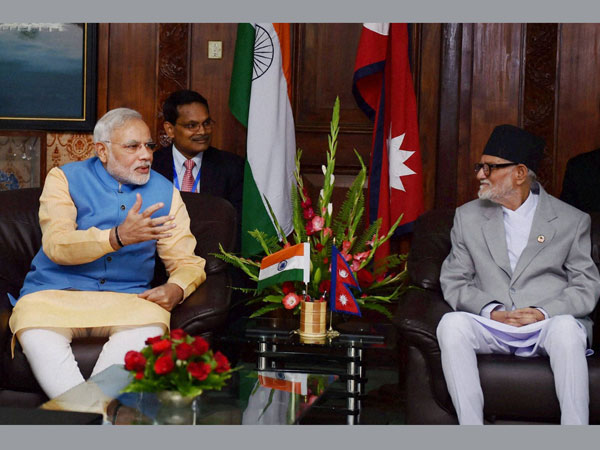
After Bhutan, it's Nepal: PM Modi's systematic approach vis-a-vis China

An Indian PM visits Nepal for a bilateral meet after 17 years
The visit to Nepal will be the second by the Indian prime minister to a South Asian neighbour within two-and-half months of coming to power. Modi chose Bhutan as the first destination of his foreign trip after assuming office [Read: Understanding India-Bhutan relations]. Is the decision to choose Nepal after Bhutan a coincidence?
After Bhutan, it's Nepal: The China factor
It
is
certainly
not.
Both
Bhutan
and
Nepal
have
considerably
long
borders
with
China
and
are
significant
for
India's
strategic
interests.
Of
the
two
nations,
Bhutan
has
been
closer
to
India
and
the
latter
has
faced
periodic
challenges
from
Nepal,
which
has
conveniently
played
the
China
card
to
balance
off
India's
influence
on
its
soil.
Influencing
post-monarchy
Nepal
Nepal in the post-monarchy days has been particularly challenging for India for New Delhi had found a favourable ally in the former institution of monarchy in that country. Once it was overthrown and the country moved forward on the way of democracy, India's policy makers started facing a bigger challenge in influencing the Nepalese minds.
New Delhi has to blame itself if China has increased influence in Nepal
India
has
watched
with
worry
how
Beijing
has
gradually
increased
its
presence
in
its
neighbourhood,
including
Nepal.
But
New
Delhi
has
none
but
itself
to
blame
if
the
Chinese
have
moved
ahead
with
its
containment
policy
against
India.
The
preceding
Indian
governments
did
pay
little
importance
to
set
things
in
order
in
the
subcontinent,
allowing
China
to
fill
in
the
vacuum.
Previous
governments
ignored
Nepal
Take the case of Nepal. Neither Atal Bihari Vajpayee nor Manmohan Singh had the time to pay a bilateral visit to Kathmandu. Vajpayee had visited Pakistan and Chine during his six-year rule and at least visited Kathmandu for the multilateral SAARC visit in 2002.
Singh,
on
the
other
hand,
never
went
to
Nepal
despite
serving
in
the
office
for
a
decade.
This
shows
how
much
New
Delhi
has
ignored
its
immediate
neighbourhood
for
nearly
two
decades,
allowing
a
powerful
competitor
like
China
to
take
advantage.
Shouldn't
New
Delhi
have
pursued
a
robust
Nepal
policy,
particularly
after
a
kind
of
political
instability
engulfed
that
country
following
the
fall
of
the
monarchy
in
2008?
PM
Modi's
fresh
initiative
Prime Minister Modi has looked to plug the hole soon after taking the office. During the visit of Sushma Swaraj, India told Nepal that the Modi government is eager to take their multifaceted bilateral ties forward faster even as the sides decided to hasten cooperation in areas of defence, security, trade and and hydro power.
The two sides also agreed to "review" and adjust" the Treaty of Peace and Friendship of 1950 to reflect today's realties.
The
Modi
government
eyes
to
stop
Nepal
tilt
dangerously
in
China's
favour
with
the
help
of
means
aimed
at
long-term
benefits.
China
is
a
country
which
increases
influence
through
kind
and
not
cash
and
it
has
already
made
inroads
in
the
smaller
countries
bordering
India
through
development
projects.
New
Delhi
has
ignored
the
changing
realities
in
Nepal
for
a
long
time
till
the
new
prime
minister
decided
to
address
the
matter
with
a
sense
of
urgency.
India
will
need
to
tighten
socks
in
the
face
of
Chinese
ideas
to
'dominate'
Beijing has already come up with ideas like BCIM Economic Corridor, the Silk Road Economic Belt and Trans-Himalaya Economic Growth Region and these, no matter how much they speak about mutual economic benefits, are going to give India sleepless nights. The BCIM ( Bangladesh, China, India, Myanmar) Economic Corridor has left India worried over the security of its northeast. Similarly, India will be worried over the Chinese influence in Nepal through the idea of Trans-Himalaya Economic Growth Region.
Other challenges for Modi
Modi's test will also lie in pressurising Nepal in stopping its soil from being used for anti-India activities. The two countries have a porous border, which makes it easy for disruptive elements for quick mobilisation on either sides. The issues of women trafficking at the India-Nepal border, power trade agreement and and extradition treaty are also in question.
A small neighbour is not essentially small when it comes to serving a nation's national interests. India was caught napping for 10 long years. Can it make up for the lost time fast?


 Click it and Unblock the Notifications
Click it and Unblock the Notifications

































